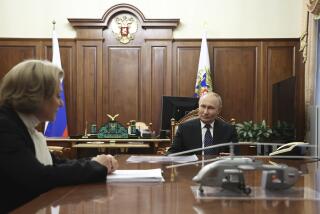Russia to Get Tougher in Chechnya
- Share via
MOSCOW — Russian Defense Minister Sergei B. Ivanov on Sunday announced stepped-up military action in Chechnya in a bid to crush rebel plans for “new terrorist acts” like the recent mass hostage seizure at a Moscow theater that ended in huge loss of life.
Shortly after he spoke, the reality of the war in the separatist republic hit again with reports that Chechen fighters had shot down a Russian military helicopter, killing nine soldiers.
“In recent days, we keep getting more and more information that on the territory of Chechnya -- and not only there -- new terrorist acts are being prepared,” Ivanov told reporters. “In some villages, the recruiting of suicidal mercenaries is underway.” He labeled the recruits zombies.
In response, Russian forces “will engage in large-scale and tough but at the same time targeted operations aimed at preventing and nipping such threats in the bud,” Ivanov said.
He added that plans for a possible reduction of Russian troops in Chechnya, which he announced this summer, will be put on hold.
The get-even-tougher policy in the war-shattered region comes as many residents of Chechnya already fear a worsening of violence from a Russian backlash against the theater takeover, which ended in the deaths of at least 119 of the more than 750 hostages. Nearly all died from a gas used to overcome most of the armed hostage-takers before police stormed the theater. About 50 rebels who seized the theater during the performance of a musical were also killed.
“The capture of hostages in Moscow was absolutely against the interests of the Chechen people,” Khas-Magomed Edelkhanov, 51, a Chechen farmer, said Sunday. “This operation ‘proved’ to the rest of the world the official propaganda lies of the Kremlin that Chechens are mostly bandits and terrorists rather than peaceful citizens.
“Everyone is tense and worried,” Edelkhanov went on. “People are afraid that any day now, cruel ‘mopping-up’ operations will begin again all over Chechnya and no one will say a protective word for us anymore.”
Chechens won a degree of autonomy for their republic in the Caucasus region after defeating Russian troops in a 1994-96 war. But Moscow’s forces marched back into the republic in 1999 and have battled guerrillas there since.
The helicopter brought down Sunday was hit by a rebel rocket fired from a movable launcher positioned in a ruined five-story building on the outskirts of the Chechen capital, Grozny, Russian authorities said. Soldiers were reported to have cordoned off and swept the area, killing two separatist fighters.
Pavel Felgenhauer, an independent defense analyst in Moscow, questioned Sunday whether any effort at new, tougher tactics can produce a military solution to the conflict.
“They have been trying to achieve this for several years now with basically zero success,” Felgenhauer said. “Ivanov’s statement to the effect that the army will from now on resort to some kind of tough but targeted sort of pinpoint blows makes me think only of more massive bombing and rocket strikes.”
In the wake of the theater seizure, however, polls show a clear toughening of the Russian public’s attitudes toward the Chechen conflict.
A survey conducted at the end of September by the All-Russian Center for Public Opinion Research showed that 34% of respondents favored a continuation of military operations in Chechnya, while 57% supported the opening of peace negotiations. At the end of October, after the theater hostages’ deaths, support for military action jumped to 46%, while just 44% supported starting negotiations.
Alexander I. Zhilin, a defense analyst for the weekly Moskovskiye Novosti, said that “right now, the climatic conditions in the North Caucasus are good for targeted bombing operations against hidden rebel bases in the mountains, now that the foliage is falling.”
But military action in Chechnya would be more successful, he added, if President Vladimir V. Putin cracked down on “the corrupt powerful clans in Russia at large and in the government in particular” who have been enjoying “huge profits” made on trade in illegal arms and in the “uncontrolled extraction and processing of oil in Chechnya.”
“He needs not only to step up special operations in Chechnya while the weather conditions are good for that and public support is on the rise again -- he also needs to simultaneously step up a struggle against corruption at all levels of Russian government and the power structure,” Zhilin said. “Without that, Chechnya will forever remain an insatiable black hole sucking up lives, funds and hopes.”
*
Sergei L. Loiko of The Times’ Moscow Bureau and special correspondent Mayerbek Nunayev in Chechnya contributed to this report.
More to Read
Sign up for Essential California
The most important California stories and recommendations in your inbox every morning.
You may occasionally receive promotional content from the Los Angeles Times.













